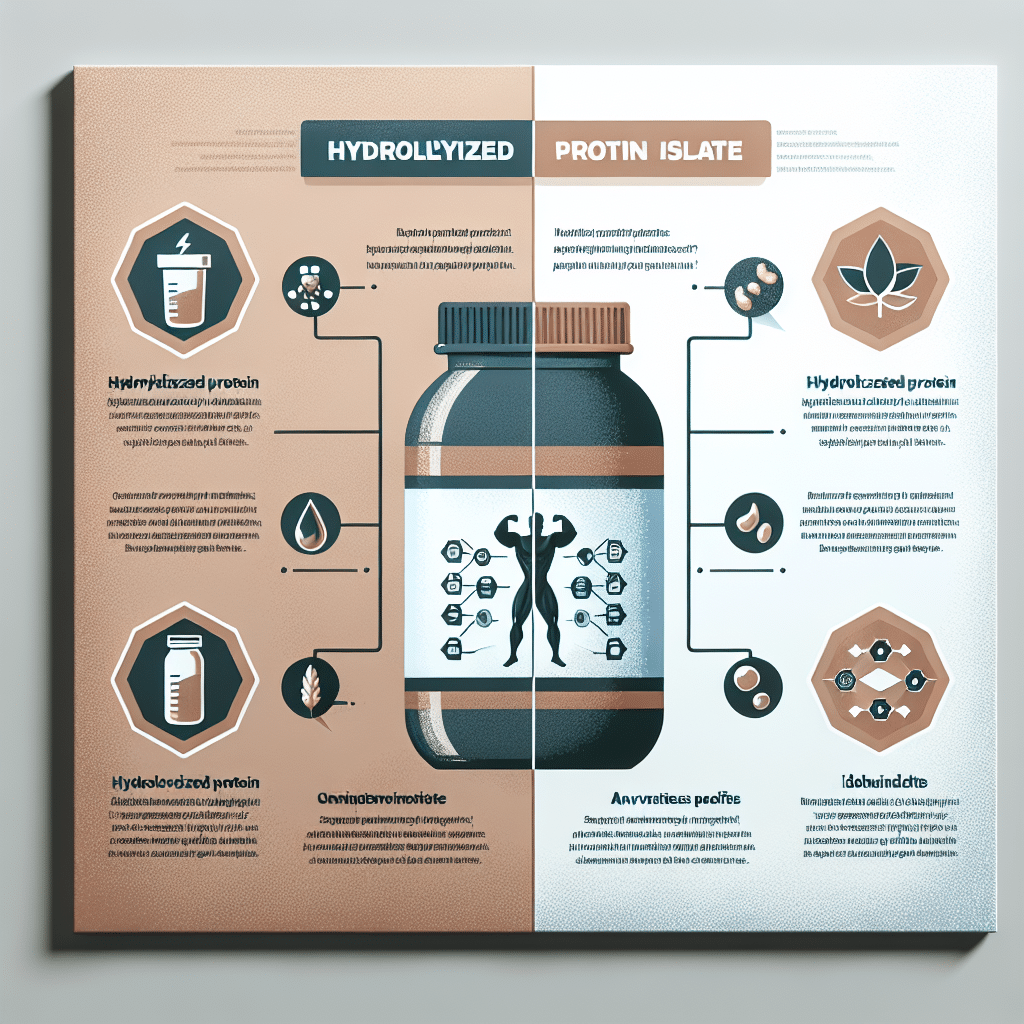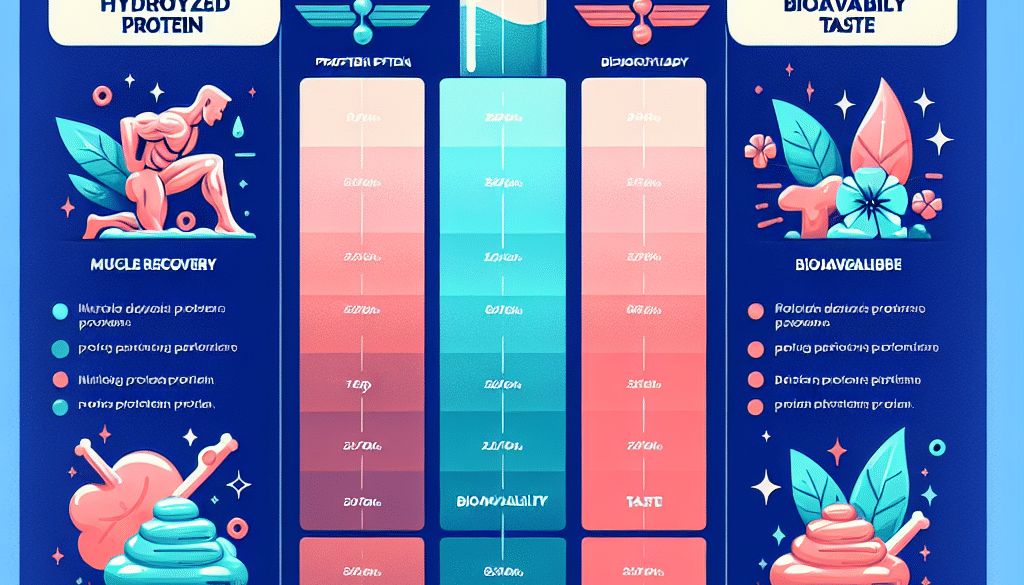Is Hydrolyzed Protein Better Than Isolate? Learn More
Table of Contents
- Hydrolyzed Protein vs. Isolate: Which Reigns Supreme?
- Understanding Protein Isolate
- Exploring Hydrolyzed Protein
- Comparing Absorption and Digestibility
- Nutritional Value and Efficacy
- Applications in Special Diets and Allergies
- Cost and Availability
- Conclusion: Making the Right Choice for Your Needs
- Discover ETprotein’s Premium Protein Products
Hydrolyzed Protein vs. Isolate: Which Reigns Supreme?

When it comes to protein supplements, the market is flooded with various types that cater to different dietary needs and fitness goals. Among the plethora of options, hydrolyzed protein and protein isolate are two popular choices that often lead to a debate: which one is better? This article delves into the science behind these proteins, their benefits, and their applications to help you make an informed decision.
Understanding Protein Isolate
Protein isolate is a form of protein that has been processed to remove most of the fat and lactose, resulting in a product that is typically 90-95% protein. This type of protein is known for its high purity and fast absorption rate, making it a favorite among athletes and bodybuilders.
- Whey Protein Isolate: Derived from milk, whey isolate is a complete protein containing all nine essential amino acids.
- Soy Protein Isolate: A plant-based option that is also a complete protein, ideal for vegetarians and vegans.
Exploring Hydrolyzed Protein
Hydrolyzed protein, on the other hand, goes through an additional process called hydrolysis, where protein chains are broken down into smaller peptides. This makes the protein easier to digest and potentially reduces the risk of allergic reactions.
- Hydrolyzed Whey Protein: Whey protein that has been hydrolyzed for quicker absorption and reduced allergenic potential.
- Hydrolyzed Collagen: Often used in beauty products, this protein supports skin, hair, and joint health.
Comparing Absorption and Digestibility
One of the main arguments for hydrolyzed protein is its enhanced absorption. The hydrolysis process pre-digests the protein, making it easier for the body to absorb and utilize. This can be particularly beneficial for individuals with digestive issues or those who need rapid protein replenishment post-workout.
Protein isolates are also known for their fast absorption rates, but they may not be as gentle on the stomach as hydrolyzed proteins. For those with lactose intolerance or sensitive stomachs, hydrolyzed protein might be the better option.
Nutritional Value and Efficacy
Both hydrolyzed protein and protein isolates are low in fat and carbohydrates, making them excellent choices for those looking to increase protein intake without additional calories. However, the hydrolysis process may reduce some of the nutritional value, as it can destroy certain bioactive peptides found in non-hydrolyzed proteins.
Studies have shown that hydrolyzed proteins can enhance muscle protein synthesis and improve recovery times. However, protein isolates are also effective in promoting muscle growth and repair, making them a viable option for athletes and fitness enthusiasts.
Applications in Special Diets and Allergies
Hydrolyzed proteins are often recommended for individuals with food allergies, as the hydrolysis process can reduce allergenic properties. For example, hydrolyzed whey protein is sometimes tolerated by those with mild lactose intolerance or milk allergies.
Protein isolates, while being low in lactose, may still pose a risk for individuals with severe allergies. In such cases, hydrolyzed protein is the safer choice.
Cost and Availability
The additional processing required to produce hydrolyzed protein often results in a higher price point compared to protein isolates. While both are widely available in health food stores and online, budget-conscious consumers may lean towards protein isolates for their affordability.
Conclusion: Making the Right Choice for Your Needs
In the debate of hydrolyzed protein versus protein isolate, there is no clear winner. The choice ultimately depends on individual needs, dietary restrictions, and personal preferences. Hydrolyzed protein offers superior digestibility and may be better for those with allergies, while protein isolates provide a cost-effective way to increase protein intake without unnecessary additives.
For those seeking a quick-absorbing protein to support muscle recovery, hydrolyzed protein might be the better option. However, if you’re looking for a high-protein supplement that is easy on the wallet and still effective, protein isolate could be the way to go.
Regardless of your choice, it’s important to consider the quality of the product and the reputation of the manufacturer. Always opt for supplements that have undergone third-party testing and are transparent about their ingredients and processing methods.
Discover ETprotein’s Premium Protein Products
If you’re in the market for high-quality protein supplements, ETprotein offers a range of organic and hydrolyzed proteins that cater to various dietary needs. Their products are characterized by a neutral taste, non-GMO, and allergen-free attributes, ensuring that you get the best in terms of both nutrition and flavor.
ETprotein’s commitment to excellence is evident in their extensive product line, which includes options for every lifestyle. Whether you’re an athlete, a health enthusiast, or someone with specific dietary requirements, ETprotein has a protein solution for you.
About ETprotein:
ETprotein, a reputable protein and L-(+)-Ergothioneine (EGT) Chinese factory manufacturer and supplier, is renowned for producing, stocking, exporting, and delivering the highest quality organic bulk vegan proteins and L-(+)-Ergothioneine. They include Organic rice protein, clear rice protein, pea protein, clear pea protein, watermelon seed protein, pumpkin seed protein, sunflower seed protein, mung bean protein, peanut protein, and L-(+)-Ergothioneine EGT Pharmaceutical grade, L-(+)-Ergothioneine EGT food grade, L-(+)-Ergothioneine EGT cosmetic grade, L-(+)-Ergothioneine EGT reference grade and L-(+)-Ergothioneine EGT standard. Their offerings, characterized by a neutral taste, non-GMO, allergen-free attributes, with L-(+)-Ergothioneine purity over 98%, 99%, cater to a diverse range of industries. They serve nutraceutical, pharmaceutical, cosmeceutical, veterinary, as well as food and beverage finished product distributors, traders, and manufacturers across Europe, USA, Canada, Australia, Thailand, Japan, Korea, Brazil, and Chile, among others.
ETprotein specialization includes exporting and delivering tailor-made protein powder and finished nutritional supplements. Their extensive product range covers sectors like Food and Beverage, Sports Nutrition, Weight Management, Dietary Supplements, Health and Wellness Products, and Infant Formula, ensuring comprehensive solutions to meet all your protein needs.
As a trusted company by leading global food and beverage brands and Fortune 500 companies, ETprotein reinforces China’s reputation in the global arena. For more information or to sample their products, please contact them and email sales(at)ETprotein.com today.














